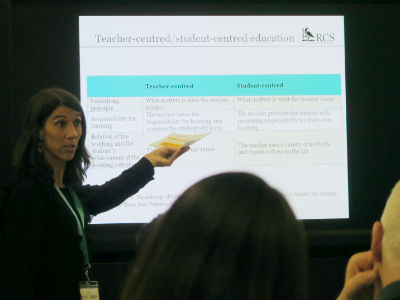Learning Design at ICOSET 2019

Conference workshop
International Conference on Surgical Education and Training
To Treat, To Teach, To Train
Exploring Professionalisation and Excellence in Surgical Training
21-22 March 2019
Edinburgh
Learning outcomes
- Describe and use an efficient Learning Design methodology.
- Design a new course with agreed learning outcomes in 70 minutes.
- Describe and share the latest teaching and learning activities.
- Incorporate new teaching activities and technologies in Learning Design.
- Evaluate the suitability of the approach to your context.
Challenges
- A seventy-minute activity to change your perception of Learning Design.
- Encourage participants to incorporate new teaching methods and technologies.
Workshop facilitators
- Alastair Simpson and Elise Omfalos
Video
This 3 minute-video will describe why the RCS has selected the ABC Learning Design method and how the Learning team has localised the method to suit the faculty surgeon’s needs and realities.
Transcript
[Q] Elise, in which context did you run the workshop?
[A] This workshop was given twice at the International Conference on Surgical Education in Edinburgh.
Each workshop welcomed up to 25 participants, divided in five groups. We had a varied range of participants, from medical students to renowned consultant surgeons.
The Royal College of Surgeons of England needed a method to inspire our course directors and faculty to see a programme from the students' perspective and encourage them to incorporate different teaching methods and new technologies.
The workshop Nataša and Clive have developed is student-centered and an effective and engaging hands-on cards-based approach to curriculum design.
[Q] Did you change anything from the original version of the ABC UCL workshop?
[A] Yes, indeed. We had just 75 minutes in total for the workshop so we had to allow less time for the activities.
Also, with the RCS e-learning development team, we tailored the learning cards to address surgical education needs and realities. As you can see here, we have shortened the definitions, illustrated them with surgical examples and also have changed the list of activities on the back.
[Q] Who ran the workshop?
[A] Alastair and I met on an ABC workshop where I was facilitating the redevelopment of a course for which he is one of the course directors.
We allowed groups to randomly sit around the tables. Groups were working autonomously and we were circulating around the room to offer our help. In some groups the magic worked perfectly.
[Q] How much whole group discussion did you have at the end of the workshop?
[A] We asked participants to fill in a survey at the end with 16 questions. We gather useful information about the material, the workshop itself and its delivery. The post workshop questionnaire is one of the other elements of localisation the RCS brought to ABC.
[Q] What lessons did you learn?
[A] Some participants suggested they have a preview on what to expect on the day, ahead of time. In future we will share information about the workshop with participants in advance.
[Q] What were the anticipated outcomes?
[A] We wanted participants to discover the ABC method, get out of their comfort zone, and develop a course in 75 minutes. Success!
All participants thought the method is useful.
[Q] What else did we learn from the feedback?
[A] According to participants, the most useful activities were: the overall canvas, activity cards, referred to learning outcomes and the spider diagram.
The less useful activities were: assessment stickers and the tweets. All participants reported it was useful to have a range of stakeholders inputting into the activity.
[Q] Now what are your plans for the future?
[A] We could train a few ABC champions who could roll out the workshop in different places.
Personally, I would like to localise further the cards adapted from Diana Laurillard, with images and less examples on the back.